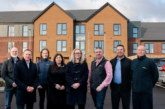
 As a sector, we place a high value on both the technical competence and the professional standards of our people, so when the Government recently launched a consultation on professional standards in the social housing sector, Abri felt it was important to respond, says Nikkie Pullen, Organisational Development Manager at Abri.
As a sector, we place a high value on both the technical competence and the professional standards of our people, so when the Government recently launched a consultation on professional standards in the social housing sector, Abri felt it was important to respond, says Nikkie Pullen, Organisational Development Manager at Abri.
All customers have the right to good service, for their requests and queries to be dealt with effectively and to be treated with respect and courtesy. Sharing insights and feedback, alongside our peers, will help to make sure our sector challenges itself and puts people at the heart of delivery.
As part of its consultation, the Government invited social housing tenants and housing providers, among others, to tell them about the qualifications currently available for those who work in the housing industry. It also asked whether any additional training is required to improve the service to customers and whether standardisation could play a role in ensuring service across the sector.
What Abri’s doing
Providing ongoing support to our colleagues to keep on developing offers an obvious benefit to both us and our customers. The more able our colleagues are — and the more they’re working to a defined standard — the more consistent our service to customers is.
For Abri this meant creating a dedicated in-house programme called Housing Professional of the Future which has the Chartered Institute of Housing’s suite of Professional Standards at its core.
The Housing Professional of the Future (HPoF) programme is a key part of this, helping our colleagues with their personal and professional development, regardless of their position at Abri. HPoF makes sure everyone has a good understanding of the sector and the values and behaviours needed, so we can all stay at the top of our game.
We’re also #proudtobeprofessional. That means we’re united by the Chartered Institute of Housing (CIH), which governs our common purpose as housing professionals, what we stand for and what we’re trying to achieve. Its standards are at the heart of our colleagues’ personal development programme.
Abri’s response to the Government’s consultation
The CIH does a great job in setting its Professional Standards, bringing the sector together with the aim of providing our customers with consistently high-quality homes and service. And it continues to adapt its approach to respond to the changing needs of the housing industry.
We’re proud to be involved in this process. Earlier this year Andy Skarzynski, Executive Director of Strategy Business Intelligence and HR at Abri, shared our ideas about professional development in the housing sector during the Department for Levelling Up Housing and Communities’ Social Housing White Paper Professionalisation Review.
We believe that anyone who works in the housing sector, regardless of their profession, has a responsibility that begins and ends with the welfare and wellbeing of our customers. Because we do more than provide homes. We create thriving communities and seek to empower lives, putting our customers first, and at the heart of everything we do.
We think that having a full understanding and appreciation of the housing sector, regardless of a person’s job, is vital. This means someone working in the sector should, as far as possible, have a ‘dual role’. For instance, a plumber isn’t just a plumber. They have two jobs. One is fixing a customer’s dripping tap. The other is to be aware of any personal, building or safeguarding concerns they may see. Likewise, for those who aren’t typically as connected to customers. A HR professional isn’t just a HR professional — they’re a housing HR professional. This ‘dual role’ mindset will allow us to better prevent issues from occurring in the first place, as well as resolving issues more quickly when they do happen.
The question is, how do we achieve this?
The CIH drives the sector with its Professional Standards framework. It brings us together by keeping the work that we do to the highest standard for customers. We want to keep building on this success. Creating greater adoption of these standards could be one way the sector can further strengthen its commitment to standards.
Header image ©EtiAmmos/AdobeStock








